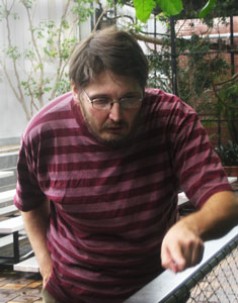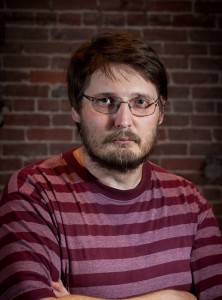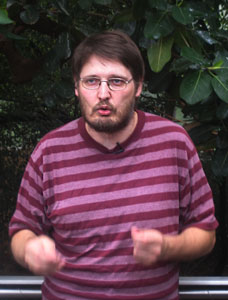Unspoken History: An Interview with Finnish Poet Tommi Parkko
by Joshua Barnes / February 6, 2012 / No comments
Finnish poet and essayist Tommi Parkko has taught creative writing at universities and workshops across Finland. He is the founder of the poetry association Nihil Interit, and has edited a number of poetry collections. His own work has been translated into English, Swedish, Russian, Estonian, Hebrew, and Lithuanian and he is the author of three poetry collections: Lyhyt Muisti, Meri [Short Memory, Sea] (1997), Sileäksi Puhuttu [Smooth Talk] (2004), and Pelikaani [Pelican] (2011).
In September, 2011 Parkko came to Pittsburgh to read at City of Asylum’s annual Jazz/Poetry concert, where he shared the stage with international poets Alexandra Petrova, Hind Shoufani, Khet Mar, Israel Centeno, and Sonia Sanchez. The poems that Parkko read were accompanied by the sounds of Oliver Lake and Tarbaby.
After the concert Parkko returned to the University of Iowa where he was a resident of the International Writing Program. Then, he traveled to Italy for another residency, where he answered my follow-up questions via email.
While he was in Pittsburgh, however, Parkko and I talked about his modernist tendencies, the difficulties of writing long-form poems in the post-post-modern age, and how mythology helps him get in touch with the “unspoken mental history” of a society.
Your poem Short Memory, Sea deals with different time periods simultaneously, yet its core images revolve around the sea and Finnish sailing history. What made you want to write a 21st century poem about sailing in the 18th century?
In this poem I’m talking about the Baltic Sea and how many cultures have been touched by it, or through it, or in it, and around it. So in the poem I talk about the chronological history of the Baltic Sea from the gypsies, Roma people, to fishermen today. Like the Baltic Sea, the Mediterranean Sea, for example, is a combination of cultures and is rooted in a lot of history. Both seas have the same kind of importance for their respective cultures.
So the poem is designed to present the Baltic Sea’s individual importance but also place it in a global setting?
That is one important point. One culture basically has a lot of influence from other cultures. Obviously there are individual cultures, but there’s a lot of overlap. For example, one very Finnish event is the mid-summer celebration. For this celebration everyone goes to these dance floors in the countryside. The floors could be in the middle of the woods, and people dance on the stage while someone plays guitar, singing classic ballads, and the people drink alcohol while they dance. So although that’s a really Finnish tradition, the guitar, alcohol, and poetry, are not. Poetry comes from Arabic culture originally. It’s funny that something that seems so Finnish really has so much influence from the past and from other cultures. You can see this over and over again around the world.
Is this trend in your poetry a response to the increasing popularity of the nationalist “True Finns” or the similar sentiment behind the July 2011 shootings and bombing in Norway?
In my example I wanted to say that our culture has plenty of influences from other cultures. Many Finns, particularly the “True Finns,” want to see Finnish culture as thoroughly Finnish. This isn’t true in my opinion, because cultural matters can cross borders. There is plenty of American influence in Finland, for instance, in popular culture. During the last few years however, critics of immigration have altered the nature of discussion a lot. But I don’t think critiques of immigration are solely a Finnish phenomenon. Many European countries have similar reactions. Immigration in Europe is somewhat different from the United States, where almost everybody has arrived from someplace else.
Mostly my poetry diminishes traditional notions of Finnish-ness, but addressing a universal person is more important to me than dealing with Finnishness as such. Of course, because of nuances in the language, translation tends to be imperfect, so I write to a Finnish audience because of my language limitation.
Short Memory, Sea is a long poem. As people expect their information to come in faster and shorter bits via technology and the Internet, long poems are increasingly anomalous. What are the complications of writing a long-form poem today?
Short Memory, Sea is actually a collection of poems that work together, not one continuous work. Today longer poems tend to be thought of as “epics,” with influence from Homer, so it’s hard because they have that stigma. Now longer poems often become, or are thought of, as a novel, or something like that. Something that can be difficult or wrong in a long-form poem is that there’s always a narrator or someone telling the story. So in Short Memory, Sea there are longer poems that are several pages, but I usually write shorter poems.
In the States there is a long history of epic poetry with Walt Whitman, Louis Zukofsky, Charles Olson, and Ezra Pound. The interesting challenge for me in writing this poem was to avoid having it become a long story. You have to keep it more succinct to keep it a poem.
“In the past, cultures would study astronomy with the help of mythology without knowing the scientific reasons behind the cosmos. Today we study the stars in the same way, but the hope that science is true is our mythology.” –Tommi Parkko
You had a blog for a short amount of time called Short Term Memory. In a post you say that “Poetry is an interesting and interested in literature.” You cite the multiple layers in Short Memory, Sea as an example. Can you explain what that comment means?
Poetry is the most interesting form of literature because through poetry you can touch on ideas you can’t in a novel or other forms of literature. In poetry there are no rules. In a novel, the rules are the framework you must have; in poetry you don’t have that type of framework, there’s more freedom, there’s no plot, you don’t have to have a story necessarily.
However, it is frustrating. People have this natural desire to read a story for some reason. But poetry is the alternative. In poetry there’s the opportunity to have simultaneous things happening in layers in one body of prose. That’s what I did in Short Memory, Sea. Because of its form poetry is an information-giver unlike any other. In poetry you can get at the truth, or reality, more-so than you can with other ways of language.
How do you mean?
You can concentrate on something very specific. Somehow poetry allows you to take a long period of time and look at the specific times within it all at once. Following that, in a particular period of time there are two kinds of history that you could deal with: The main history of a civilization that we all learn about and the unspoken mental history of a civilization. That unspoken history is what you can deal with in poetry. In this book I deal with mythology much more than with history.
Is it through mythology that you can understand a 200 or 300 year-old thought process?
Aristotle says history is a series of individual happenings and poetry is universal. In the same way, if my writing is based on history, then I have to address these specific, individual happenings. But with mythology, if I’m addressing that, there’s more I can say that’s not so specific.
In writing Short Memory, Sea I was influenced by Ezra Pound, who wrote about the Mediterranean Sea from a cultural perspective and about the connections between Mediterranean culture and the United States.
So, like Pound, using mythology as a cultural tool allows you to talk about history without writing about specific events in time…
Historically, mythology organizes scientific information. In the past, cultures would study astronomy with the help of mythology without knowing the scientific reasons behind the stars or the cosmos. Today we study them the same way, but we don’t see it as a mythology; now we know that we can believe it based on science. The hope that science is true is our mythology.
It’s interesting to look at the mythology of older cultures and see how they have upheld their beliefs since then. Are those ancient beliefs now purely mythology? I am interested in where science and mythology intersect—not that one or the other is incorrect—but there is a correlation between the two and I like to look at that in my poems.
Can you talk about the state of Finnish poetry today? How do you fit in with the poetic tradition, Finnish or otherwise?
At this time in Finnish poetry there is a tendency for modernism from the 1950s and a more contemporary experimentation to be in contrast with one another. I personally don’t find myself creating anything very “traditional”—as in, before the 1950s, with typically rhyming poetic verse. Modernism has a 60 year old tradition and I feel I belong to that. The poetry of the 50s was powerfully descriptive. Ezra Pound’s imagism, for example, had a strong influence on me.
Experimental poetry has its origin in the historical avant garde and in a movement like OuLiPo. Also the American Language school’s way of thinking has had an influence on our poetry. I belong to a publishing company that publishes experimental poetry, but I personally don’t write it.
In Finland there is a diverse range of poetry being written right now, so it’s hard to put myself in one category. My work isn’t very contemporary—it touches more on modernism and postmodernism—so I don’t necessarily experiment that much. My interest is in going deeper into what I do and what interests me in my style rather than trying to expand on the way I write, or the imprint of my style.

Tommi Parkko points to his muse, the pelican, at the National Aviary, Pittsburgh.
Photo: Olivia Stransky
In a 1991 issue of the Atlantic Dana Giola wrote an essay called “Can Poetry Matter?” which addresses issues of poetry’s increasing insularity. It’s been 10 years since the article’s been written. Have you seen a change in this trend? Has the trend gotten worse?
Contemporary experimental poetry is actually written for other poets. That kind of poetry sells maybe 200 to 300 copies and the readership is very small. I’ve probably sold about that much in Finland and when talking with other poets, internationally it seems to be the same case. I don’t think that poetry has to have a huge readership or following; I think that’s impossible. If your goal is to get a lot of readers you’re probably going to have to compromise your work.
In your poem “The Pelican,” there’s a line that says, “do not turn your back on a world / that does not give you your voice.” Considering today’s poetry market from the context of the next generation of poets, why shouldn’t they turn their back on a society that will not listen to them?
If a poet wants to turn their back on the world, they can—but they don’t have to. They can do the opposite. If poetry has a worldly social significance, then the ideas of the poet should come from them, from inside, instead of from the outside. If you think about the idea of a social need or, alternately, restrictions to make one write a certain way to please a nation, then as a writer you see that you can choose whether to follow that “need” or not. Poets should emphasize what comes from inside them instead of being so affected by the outside. They should feel free to express themselves.
That poem’s background story comes from the mythology of the Bible. Adam and Eve give the animals their names and there is a mythological moment where the animals’ own sounds are developed; the lion roars, the cat meows, etc. In this poem I was thinking about how humans can be left without their voice, physically or otherwise. To explain: Someone has lost his “voice” because he sleeps through the event where he could have been given one. He was too late. It’s sort of a complicated way to express the idea of a poet’s role in society. His sleeping could be a metaphor for the need for poetry—his inability to speak isolates him from society, but keeps society isolated from him too. Younger poets should know that their voice is something valuable. They should use it.






